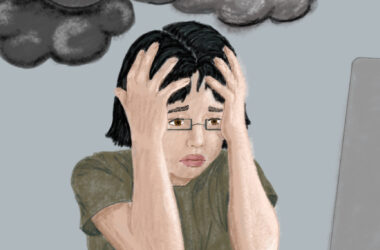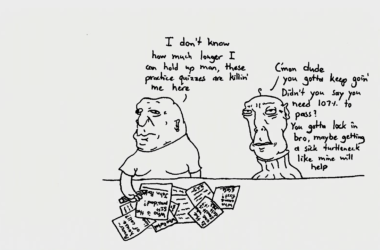My university experience has not been the conventional one.
I entered McGill as a first-year student in the fall of 2020, during the peak of the COVID-19 pandemic. Classes were online, and I felt disconnected from my fellow student community. Making matters worse, I could not come to Montreal during my first semester, which made me feel all the more distant from student life. Having spent my first two years of university behind a computer screen in my bedroom, at a café, or in a public library, I missed out on so much. Not only was I unable to meet people and make friends at school, I also didn’t have the opportunity to benefit from McGill clubs and events. Like many others, I felt robbed of my university years, which everyone told me would be the best of my life.
When I look back at it, although my younger self was sad that she couldn’t attend all those fun university events, I now realize there was much more to McGill than just making friends and partying. I wasn’t just missing out on the fun: I was also missing out on the relationships, the in-person learning opportunities, the networking, and the chit-chatting with professors in the hallways. These experiences would have helped me build my career path, find exciting opportunities, and grow personally and professionally. I am now in my third year and graduation is looming. This lack of connection to my school and its prestigious community has slowed me down in my pursuit of a career.
Graduating is scary. You are thrown into the real world, and cast into a sea of opportunities. This puts a lot of McGillians, especially “COVID-students,” under a significant amount of pressure toward the end of their degrees as they try to plan their careers in an in-person world that Zoom school did not prepare them for.
The stress of graduating
The McGill community is extremely competitive. McGill is indeed a highly-ranked, global institution where students are concerned with their academic performance. I’m sure you can relate to watching students discussing and judging each other’s successes and achievements, leaving others (and maybe yourself) feeling inadequate.
Michelle Maillet, an undergraduate program advisor in McGill’s geography department, has come across a number of students who feel distressed because of constant comparison with other students.
“Some people go to their advisors to talk about their insecurities, claiming they don’t know what to do once they graduate,” Maillet said. “These are common discussions that students have behind closed doors with their advisors. But between themselves, they don’t share this concern, for fear of being judged.”
Students must understand that one “correct” career timeline just does not exist. Just because someone else sounds like they have their whole life planned doesn’t mean that you’re falling behind. While some people are natural planners who meticulously calculate every step of their careers, others prefer to go with the flow. It’s important to strike a balance between planning and being adaptable.
Graduate applications, job hunting, and looking for internships are arduous and time-consuming tasks. As these processes often take place during the final year before graduation, which for some, is the most difficult year in their degree, McGillians feel increasingly overwhelmed.
Mira Almrstani, U3 Arts, has had a lot on her plate, particularly with the stress of her looming graduation.
“Honestly, trying to juggle workload with internship or job applications has been difficult, especially being in such a fast-paced, high-demand environment,” Almrstani said. “Trying to find the right step, narrowing down what I want to do with my life after my undergrad, and trying to find something within my skill set and experience has made me feel overwhelmed and stressed.”
A competitive environment, a devastating COVID pandemic, and difficulty juggling tasks are some of the biggest concerns among students on the verge of graduating. However, this stress can make students forget that it’s alright not to have their whole life figured out. What matters is making the most of your experience and developing as a person.
What to do with an Arts degree
In life, you never stop learning. You will continuously have new experiences and develop in both your career and your personal life. A lot of students are fixated on jobs that they feel their degrees directly lead to, which can be daunting. This is especially the case for Bachelor of Arts students, who are unsure how to parlay their studies into a profession because a BA isn’t necessarily a professional designation degree.
“As an Arts student, you must see yourself as a jack-of-all-trades,” Maillet said. “You have qualities and some expertise in a variety of topics. You can navigate working with many different stakeholders and you’ve been taught to be a critical thinker. So it’s not just about the marketable skills. It’s about using your critical thinking skills and knowledge, and continuously developing them.”
Your experiences at McGill matter more than you think. What you do outside the classroom, whether it’s participating in newly-opened clubs and athletics, organizing events, or contributing to student associations (yes, even in your third year), are very valuable for your personal and professional growth. Through these experiences, you will discover more about yourself, learn transferable skills that you can’t learn in class, and take on tasks that will help guide you toward a career you’re interested in.
So don’t worry too much. Go with the flow, let one experience lead you to the next, and never overlook the value in seizing different learning opportunities in all their forms.
Benefitting from McGill services while you can
If you need help navigating your post-graduate options, you should also try using Career Planning Services (CaPS). CaPS at McGill is like your personal career GPS, guiding you to your dream job and helping you develop the skills and experience to take it on. With CaPS, you can explore different career options, get expert advice on job search strategies, and learn how to make your resume and cover letter stand out. They also provide interview preparation support to help you impress prospective employers.
In addition, CaPS offers exciting career workshops and events, employer information sessions, and networking opportunities to connect you with employers and industry professionals. Plus, you’ll have access to exclusive job postings and internships to jumpstart your career.
With the click of a button, you can find everything on their website. They are also very accessible, open every day from 9 a.m.-5 p.m., and are always present on the second floor of the Brown Student Services Building.
Susan Elizabeth Alersh, associate director of CaPS at McGill, shared some of the benefits of this service in an interview with the Tribune.
“The goal of CaPS is to get students to start thinking about their careers as early on as they can,” Alersh says. “Whether at orientation or before students even come to McGill, they should be aware of these services to get exposure right away.”
So, as a McGill student, try benefiting from these services available to help you succeed!
Moving forward toward growth
Although my university experience has not been the one I imagined, I feel that I owe it to my younger “COVID-student” self to take advantage of everything I can on campus in my third year. Whether it’s using the McGill-offered career services, joining clubs and student associations, or even having conversations with professors during office hours, I constantly look for new opportunities to experience, learn, and grow. I’ve found this to be tremendously beneficial, allowing me to find internship opportunities and research assistant positions, and helping me figure out what career I potentially want to pursue. I truly believe that by adopting a similar mindset, others can enjoy experiences that bring them joy, light them up, and, who knows? Maybe eventually you’ll figure out what career path suits you the most, or at least, which step to take next.







